
On her way to receiving a Ph.D. in civil engineering, Sarah Hlaihel credits her grandmother for putting her on the path: “since I was a kid, my grandmother encouraged us to go for our Ph.D.”
Fueled by her grandmother’s wishes and her drive for environmental responsibility while growing up in Lebanon, Sarah has studied globally, aspiring to be among the next leaders of the energy industry. Hlaihel completed her bachelor's degree in physics and her first master's degree in energetic physics at Lebanese University.
“Coming from a region that faces both environmental and energy challenges, I developed an early appreciation for the importance of sustainable infrastructure in the energy field,” Hlaihel said.
Deepening her passion for sustainability, Hlaihel pursued her second master’s at the École Normale Supérieure Paris-Saclay where she specialized in sustainable construction and low impact materials. Currently in her fourth year at UH as a Ph.D. student in civil engineering, Hlaihel is part of a research team with her twin sister, under the supervision of Dr. Konrad J. Krakowiak. Hlaihel’s research focuses on the valorization of industrial byproducts such as coal combustion residues, slags and recycled concrete fines.
“I do this through using the supercritical CO2 mineralization. My goal is to contribute to the development of ecofriendly and durable construction materials, and I see the energy industry as a key driver for sustainable solutions,” Hlaihel emphasized.
By finding ways to reuse these waste materials, the industry will be able to lower carbon emissions, reduce waste going into landfills and conserve natural resources. Chevron’s emphasis on innovation and sustainability in addition to their unwavering support towards graduate students is what attracted Hlaihel to their fellowship program.
“Since my work is focused on development of sustainable construction materials through the mineralization of CO₂, I actually saw a strong alignment between my research goals and Chevron’s commitment to lower carbon solutions and responsible resource use,” Hlaihel said.
As a 2024-2025 UH-Chevron Energy Graduate Fellow, Hlaihel has been able to reach new
heights with her research. Beyond the funding, the fellowship has opened a lot of
doors for future collaborations with industry professionals.
“I believe it's essential for bridging the gap between lab scale research and the
real-world applications,” Hlaihel expressed. “By connecting with professionals, it
was really helpful that I was able to see how this can be done in the real-world application.”
Hlaihel is also a teaching assistant for engineering courses. She has been nominated for the Future Faculty Program at the UH Cullen College of Engineering. The program aims to prepare graduate students to become effective instructors at the top engineering schools. Hlaihel attributes her enthusiasm for teaching to the educators who have shaped her academic journey.
Hlaihel would like to thank her professors who have kept her inspired along the way. She gave special mentions to Dr. Louay El Soufi who encouraged her to travel to France to further her education; Dr. Farid Benboudjema who was her advisor in her masters who pushed her to get her Ph.D.; Dr. Walid Maherz who interviewed her in France and gave her the Ph.D. position she currently has; and Dr. Ahmed Senouci and Dr. Konrad J. Krakowiak who have welcomed her with open arms and guided her during her doctoral journey.
After graduation, Hlaihel hopes to find a balance between industry and academia—developing durable, low-carbon construction technologies while staying engaged with students through teaching or mentorship. Though she is unsure whether supervising students while working in industry is feasible, she remains eager to support the next generation in areas like carbon capture and sustainable energy.
“I'd like to use this platform to amplify the impact of my research and to demonstrate
how industrial waste can be transformed into valuable resources that support carbon
capture,” Hlaihel said.